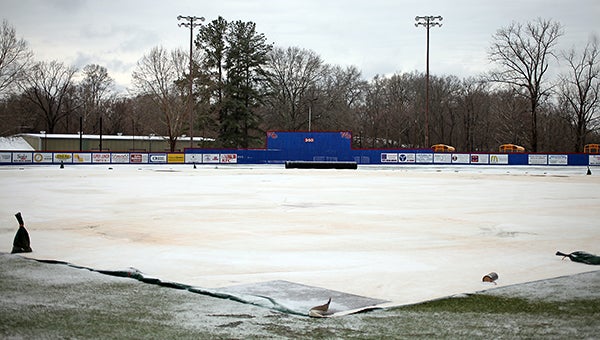Bad weather ups challenge of field maintenance
Published 10:36 am Friday, March 6, 2015

A layer of snow and ice covers Warren Central’s Viking Field on Thursday. The tarp covering the infield, however, will help Warren Central have the field ready in time to host Lewisburg and Central Private on Saturday. (Justin Sellers/The Vicksburg Post)
On Wednesday, Vicksburg High softball coach Brian Ellis and Warren Central baseball coach Conner Douglas took their riding lawnmowers for a spin through the outfield at their respective ballparks.
Twenty-four hours later, the freshly cut grass lay beneath a coating of snow and ice while both coaches sat at home waiting out yet another weather-induced off day.
Thursday’s winter storm was the second to hit central Mississippi in two weeks, and the seventh time in the last 13 days that there has been measurable precipitation in Vicksburg. When players and coaches return to the field today, it’ll be as much to work as to practice. They’ll turn on shop vacs and push squeegees to move water out of sodden infields and hopefully get everything back into game shape.
“Our field drains well and slopes down. We’ll put a pump out there and send it into the drain over by the dugout,” Douglas said. “There’s nowhere for it to go but off. It can’t go in the ground because it’s so wet, so we just have to wait for it to dry.”
Rain is the natural enemy of baseball and softball players. Snow and ice are worse, though. Although the cold doesn’t kill the rugged rye grass used on most fields, there’s little that can be used to melt the frozen precipitation other than sunlight and warm temperatures. Once it does melt, there’s also still the issue of the same wet fields caused by rain.
“You’ve got to wait for it to thaw, so it’s going to be a longer process,” said Ellis, who had one game earlier this week moved from the Missy Gators’ home park to Germantown, and another postponed on Thursday. “If we were going to try to move that (Thursday) game to (Friday), we’d have to wait for it to melt, and then it’s just like getting rain.”
There’s plenty that can be done to remove water from a field, but the easiest way is to make sure it doesn’t get on there in the first place. Drainage is the key to that.
Both Douglas and Ellis said their fields were constructed so that water runs off into nearby storm drains. Porters Chapel Academy’s baseball field underwent improvements in recent years to accomplish the same goal.
PCA has had a half-dozen rainouts already this season, but coach Wade Patrick said that’s been more bad luck than bad field maintenance. Storms spaced a few days apart barely let the field dry out before the next one moved in.
“This seems like an abnormality that it’s happened this many times. It’s the amount of water we’re getting. It can’t hold four days of rain,” Patrick said. “Our field is in great shape. But when you’ve only been on it once or twice, it should be.”
Warren Central’s baseball team has the ultimate weapon against wet weather — the tarp. The huge sheet of material covers the infield, and there are several smaller ones to give added protection to the pitchers’ mound and home plate.
Keeping the infield relatively dry while the outfield is left to fend for itself is the top priority when it comes to field maintenance. A wet outfield is an inconvenience, coaches said. A wet infield is disastrous.
“As a coach, you can live with a wet outfield. Most of the time the ball is out there it’s in the air, and if it’s on the ground and the ball is wet you can get another one. The infield, the ball is always on the ground and it’s hard to handle it,” Patrick said. “For the outfielders it stinks because they get wet feet. For the infielders, it’s mainly to keep the ball dry.”
Warren Central baseball is the only baseball or softball program in Warren County with a tarp and it’s saved many a game. Despite the rain, snow and cold, Douglas said he expects to be able to play a scheduled tripleheader Saturday involving his team, Vicksburg, Lewisburg and Central Private.
Protection and field maintenance comes at a cost, though.
Douglas said the tarp cost $6,000. Costs for field conditioner, drying agent, mound clay, fertilizer and grass seed can easily match that, and the more it rains the more each program uses. That made the tarp a wise investment, he said.
“We spend $1,000 a year on conditioner. We put 15 bags on it the other day at $14 a bag. It gets pretty expensive,” Douglas said. “Rye grass is $75 a bag, and you put out 24 bags. Every month you put out $200 worth of fertilizer. Mound clay is $12 a bag and we’ll use about 40 bags a season. So you can see why we don’t want to dump $1,000 on the field every time it rains.”
Field maintenance goes beyond lawn care. Knowing when to keep off the grass, or at least how to keep it from getting chewed up, is key.
At Warren Central’s softball practice Wednesday afternoon, coach Dana McGivney hollered to her center fielder Coco Fultz to move around a bit during fielding drills. The goal wasn’t to reposition Fultz for a new batter, but to keep the muddy grass under her feet from getting torn up from overuse.
Ellis said other tactics are also useful.
“A lot of teams will require kids to have turf shoes or tennis shoes instead of cleats. Our outfield is newer grass and we’ve been babying it and doing that,” Ellis said.
There’s also the option of leaving the field entirely. Every team has access to some sort of covered or indoor facility for inclement weather.
St. Aloysius’ baseball team once converted the old Blackburn Nissan dealership on Washington Street into a full-service baseball practice facility, complete with makeshift pitcher’s mounds and batting cages. St. Al is now one of several teams that use the indoor facilities at Elite Performance Sports on U.S. 61 South.
“We’ve been there almost every day since we started practice on February 2,” St. Al coach Steve Hancock said. “It’s been a lifesaver for us. There’s three full-length cages, two indoor mounds, a turfed area we can work on defensive situations with and a pitching machine.”
Porters Chapel and Warren Central have batting cages in their baseball fieldhouses. Warren Central softball has a covered batting cage, and Vicksburg’s softball and baseball teams use the ROTC armory on Lee Street, down the hill from the school building.
The indoor facilities allow teams to do some drill work, which is useful but has its drawbacks.
“One of the things about being inside, unless you have this huge facility it’s a lot of drills and station stuff. If we’re in the armory, we can’t get out the real softballs because there’s no netting,” Ellis said. “It’s stuff we’d do anyway, but it’s with Wiffle balls instead of softballs. You also have to worry about the attention span of teenagers. I cut my practice down when we’re inside. If I can go two hours and keep them busy, that’s a good practice.”
Patrick said the indoor work only goes so far. Pitchers are unable to properly throw in the tight confines of a batting cage, and hitters don’t see the type of pitching they need to see to get ready for the season.
It’s also difficult to practice baserunning, defense and a number of other crucial game situations inside.
“What hurts is not having the actual game speed and picking up pitches. You can’t simulate that,” Patrick said. “It’s difficult. It takes a while to adjust. That’s why I think our offense has struggled early in the season.”
Of course, the indoor facilities and alternate practice locations are merely a workaround. The field maintenance keeps things humming, but is only part of the equation. Only a string of dry, sunny and preferably breezy days can get things back to normal.
Until then, coaches and players alike will continue to work — and wait for warm spring temperatures to finally break winter’s icy grip.
“The field is already wet and soaked through. Then you have ice and know when it melts that all it’s doing is adding on to what’s there,” Patrick said Thursday afternoon as he ran errands instead of conducting practice. “Right now you can’t do anything.”



